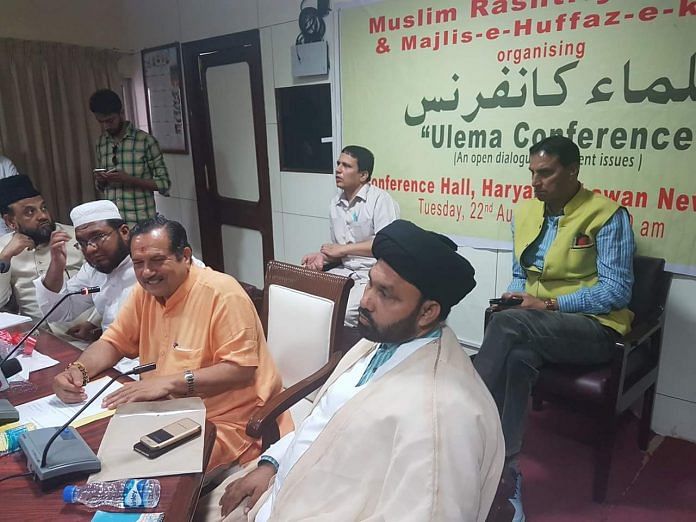
RSS leader Indresh Kumar abruptly shifted the conference’s focus from cow slaughter to triple talaq.
The Supreme Court’s latest decision banning triple talaq left some participants in a summit between Muslim clerics and the RSS-affiliate Muslim Rashtriya Manch uneasy over the sudden change in the agenda for the day.
Most participants at Tuesday’s Ulemas Conference, who were mingling as the Supreme Court’s judgment was announced, were caught off guard when RSS leader Indresh Kumar announced the news and abruptly shifted the conference’s focus from cow slaughter to triple talaq.
Kumar, undeterred by the topic’s absence on the conference agenda, launched into a lecture praising the court’s decision. He proposed a resolution supporting the ruling and requested that the government provide houses or colonies for talaq victims and their families in every district. When Kumar announced that “we should support (these victims),” many of the diverse array of 50 Muslim clerics congregating at Delhi’s Haryana Bhawan broke out in applause.
The RSS leader defended his proposal by saying that he had verified with many Islamic scholars that the Quran and Hadith contain no instances of instant triple talaq.
“Everyone should go back and read Quran Sharif if they disagree with me and come back with Quran Sharif and argue,” Kumar told the conference.
Some of the clerics, though, thought Kumar’s call for a resolution went too far off script. They had agreed to participate in the meeting under the assumption that it would focus on cow slaughter and preferred not to vote on the resolution until they could more fully formulate their positions. Though none directly objected to Kumar’s proposal, some said the topic required more discussion before they could join in a resolution.
Mohammed Qamar, a mufti from Deoband, said that while the entire conference would accept the Supreme Court’s decision, he and the other clerics needed more time to partake in such a complex national debate.
“Whatever (Kumar) has said is right but the issue is nuanced and has many interpretations that have not been discussed,” said Qamar.
“Indresh is right there is no provision of instance of triple talaq (in these holy books). However, now that the issue is in the media also, there will be meetings of supreme Ulemas and consultations with the Muslim personal law board,” he added.
Qamar would not say whether he agreed with Kumar’s contention that triple talaq is a social issue and not a religious one.
“Divorce is a routine in many people’s lives,” Qamar said. “They say Muslims will be helped by the new decision but there is a fear that men afraid of divorcing wives will commit suicide as they won’t be able to live with them either.”
While some clerics expressed similar sentiments to Qamar, other Muslim clerics echoed those of the RSS leader.
“The Supreme Court’s decision is a welcome one but there is a provision of triple talaq in our religion. However, we should not make use of it as it is not to the liking of Allah. And the resolution of setting up homes for divorced women is a great idea,” said Sayyed Afraan Chisti of Ajmer.
After calling for the resolution, Indresh concluded his speech by warning participants and the Muslim community at large that clerics should not give pronouncements on matters outside of the Quran.
“Maalik (Allah) wants Nikaah and not talaq. How many children you have has nothing to do with religion. There are many things you do in name of religion” that are in fact social and not religious issues, Kumar said.

COMMENTS